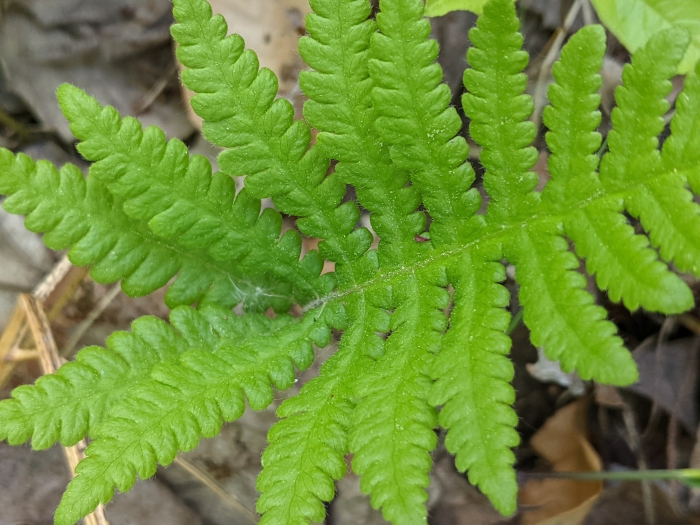Long Beechfern
(Phegopteris connectilis)
Long Beechfern (Phegopteris connectilis)
/
/

Benoit Renaud
CC BY 4.0
Image By:
Benoit Renaud
Recorded By:
Copyright:
CC BY 4.0
Copyright Notice:
Photo by: Benoit Renaud | License Type: CC BY 4.0 | License URL: http://creativecommons.org/licenses/by/4.0/ | Rights Holder: Benoit Renaud | Publisher: iNaturalist | Date Created: 2021-05-19T17:03:36-07:00 |
















































Estimated Native Range
Summary
Phegopteris connectilis, commonly known as Long Beechfern, Northern Beech Fern, and Narrow Beech Fern, is a deciduous perennial herbaceous plant. It is native to the cool, moist, shaded understory of temperate deciduous forests, often found in humus-rich and well-drained soils. This fern is widespread across the Northern Hemisphere, including North America, Europe, and Asia. It typically grows to a height of 12-18 inches (30-45 centimeters) and has a similar spread. The fronds are triangular, delicate, and light green, with a feathery appearance. They emerge in spring and remain attractive throughout the summer until they die back in the fall.
Long Beechfern is valued for its ease of maintenance and its ability to thrive in shaded conditions where other plants may struggle. It is often used in woodland gardens, shade gardens, and naturalized areas. It provides texture and greenery to shaded spots and is particularly effective when planted in mass as a ground cover. While it prefers moist, well-drained soils, it is somewhat drought-tolerant once established. It is not typically troubled by pests or diseases but can suffer from root rot if the soil is too wet. This fern does not have significant problems with invasiveness and is not known for aggressive roots. It is, however, sensitive to environmental changes and may not thrive in polluted or heavily altered landscapes.CC BY-SA 4.0
Long Beechfern is valued for its ease of maintenance and its ability to thrive in shaded conditions where other plants may struggle. It is often used in woodland gardens, shade gardens, and naturalized areas. It provides texture and greenery to shaded spots and is particularly effective when planted in mass as a ground cover. While it prefers moist, well-drained soils, it is somewhat drought-tolerant once established. It is not typically troubled by pests or diseases but can suffer from root rot if the soil is too wet. This fern does not have significant problems with invasiveness and is not known for aggressive roots. It is, however, sensitive to environmental changes and may not thrive in polluted or heavily altered landscapes.CC BY-SA 4.0
Plant Description
- Plant Type: Fern
- Height: 0.8-1.5 feet
- Width: 1-3 feet
- Growth Rate: Moderate
- Flower Color: N/A
- Flowering Season: Non-Flowering
- Leaf Retention: Deciduous
Growth Requirements
- Sun: Part Shade, Full Shade
- Water: Medium
- Drainage: Medium
Common Uses
Low Maintenance, Rabbit Resistant, Water Garden
Natural Habitat
Temperate deciduous forests
Other Names
Common Names: Long Beech Fern , Narrow Beech Fern , Northern Beech Fern , Beech Fern , Dunet Egebregne , Buchenfarn , Dryoptéride Du Hêtre , Fougère Du Hêtre , Lastrée Du Hêtre , Phégoptère Du Hêtre
Scientific Names: Phegopteris connectilis , Thelypteris phegopteris , Phegopteris polypodioides , Dryopteris phegopteris , Polypodium phegopteris , Lastrea phegopteris , Aspidium phegopteris , Phegopteris vulgaris , Nephrodium phegopteris , Phegopteris phegopteris
GBIF Accepted Name: Phegopteris connectilis (Michx.) Watt